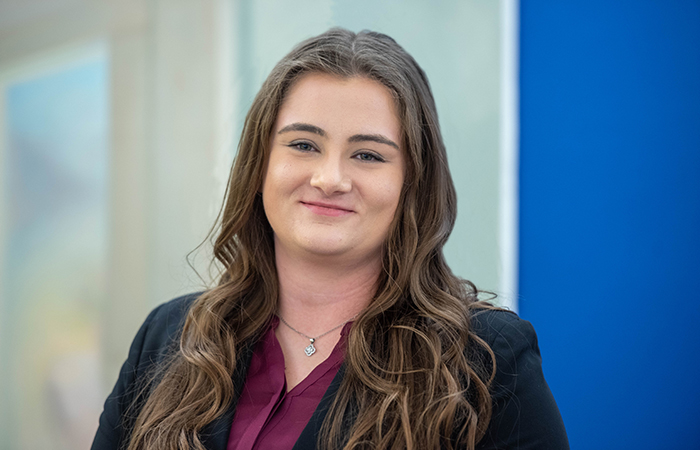Watching researchers solve pandemic problems leads student to public health focus
Master of Public Health student Julia Weakley has a promising new career—and in May, a new academic degree
For Julia Weakley, the dark clouds of the COVID-19 years were offset by a silver lining that has changed her entire life’s trajectory. The pandemic led her to discover a whole new way of thinking about her ideal career in health care—one that focuses on populations rather than on individual patients.
And now, her switch to public health has paid off. She is in her final semester of the Master of Public Health (MPH) program at Texas A&M University, and an internship with the Brazos County Health District has turned into a full-time role as an environmental health specialist. She hopes to focus her career on helping communities track and overcome foodborne and waterborne illnesses.
Weakley began her undergraduate degree at Wharton County Community College in 2016. She continued her studies as a biology/pre-health major at the University of Houston-Clear Lake while also holding various part-time jobs. Her work assisting physicians with patient charts at Houston Methodist Sugar Land Hospital made her certain that a health care career was in her future.
By the time she graduated cum laude in May 2020, however, social distancing, masking and other COVID-19 measures were firmly in place. Intrigued by the hard science and human drama involved in tracking a previously unknown virus and predicting its impact on people around the world, Weakley switched gears to begin her master’s degree with an epidemiology focus in August 2022.
“I went into my MPH degree not completely sure which direction I wanted to go,” Weakley said. But that changed in May 2023, when she began a practicum/internship with the Environmental Health Services section of the Brazos County Health District in Bryan, Texas.
Her responsibilities included getting information from experts at the state and federal levels about investigations into outbreaks of foodborne illnesses. She found that she not only enjoyed this type of collaboration and data gathering, but the MPH program had prepared her well for it.
“Going into the program, I know public speaking was an area of weakness for me,” Weakley said. “But the different presentations associated with the MPH coursework prepared me for professional speaking roles. That was major!”
As an MPH student, Weakley was selected to give a presentation at a conference of the Texas Environmental Health Association in Georgetown in 2023. Two more—to the Texas Association of City and County Health Officials in Houston and the Integrated Foodborne Outbreak Response and Management Conference in Washington, D.C.—are slated before her graduation in May 2024.
“For me, the most surprising thing about my MPH journey has been the number of opportunities students have for further exploration within the field of public health,” Weakley said.
She credits two faculty members in the Department of Epidemiology and Biostatistics for providing especially valuable guidance: Angela Clendenin, PhD, instructional associate professor, and Taehyun Roh, PhD, assistant professor.
“Being in Dr. Clendenin’s studio for the MPH core courses inspired me to try new things, and she helped show me how the field of epidemiology can be versatile,” Weakley said. “Dr. Roh always takes time in class to go over current research articles and has good recommendations on other topics to further look into, and his advice helped me make some very important decisions.”
Her advice to those interested in a career in public health: “Network and talk to as many individuals within the professional setting as you can,” she said. “You never know what doors might open, even if you were just asking a question. What started out as one email asking a question to someone from the state health department has expanded into multiple opportunities and experiences, which I probably would have missed if I had not sent that one email.”
And like those who went before her, Weakley eagerly looks forward to showcasing her chosen profession to others interested in health care.
